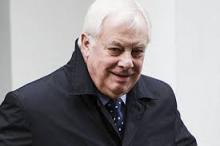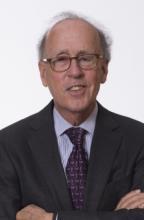From Brexit to Eternity
LONDON – British members of Parliament will soon have to make one of the most difficult political decisions of their lives. The choice is between approving the Brexit deal that Prime Minister Theresa May has negotiated with the European Union, crashing out of the EU with no deal, or trying to reverse the exit process altogether. With respect to the third option, it has been two and a half years since a slim majority of Britons voted to leave the EU, and recent polls now find that a majority would prefer to remain.
The decision to hold a referendum on EU membership was made by May’s Conservative predecessor, David Cameron, who seems to have been focused more on politics than the national interest. Cameron was hoping to defang a faction of right-wing English nationalists and opportunists in his party, but his inept gambit blew up in his face and he promptly resigned, leaving to his successor the unenviable task of interpreting what the referendum outcome actually meant. She decided that “Brexit means Brexit,” and has since been leading a process that she herself originally opposed.
From the start, May’s task was complicated by three factors. First, the Brexiteers had woven a web of mendacity and delusion about what withdrawing from the EU would actually mean. They promised an easy exit that would allow Britain to have its cake and eat it. The country would gain much, lose nothing, and sail off to a promised land free of EU regulations. As masters of their own fate, Britons would cut new trade deals with whomever they liked. Yet, to the Brexiteers’ apparent surprise, the EU could not and would not allow a country to enjoy the full benefits of membership without accepting the obligations that come with it.
The second complication was that Britons had a lot to learn about sovereignty. Generally speaking, sovereignty enables a country to secure its own interests. But this usually requires working with others. What the Brexiteers seem not to have realized is that the 27 remaining EU member states have far more power to pursue their own interests collectively than they would on their own. And that is exactly what they have done throughout the Brexit negotiations.
Critics of May’s exit deal complain that it will give Britain even less say over its own affairs than it has today. But that would still be the case outside of the EU. Whether rules governing economic, environmental, and social relations are written in Brussels or elsewhere hardly matters. If Britain wants to do business with others, it will have to agree to common rules. Once it is out in the cold, it will have to decide with which economic bloc to align, and then accept that bloc’s rules.
This is not about sovereignty or satrapy. It is simply a question of whether we would prefer China’s approach to intellectual property and technology transfers over those of the West, or European food and agricultural standards over those of the US. If Britain insists on pursuing a purist definition of sovereignty, it will find only grief and isolation.
The third complication was of May’s own making. Immediately upon entering into the exit negotiations, she started laying down unnecessary red lines. The language of the Brexit referendum did not include any mention of the EU customs union and single market, or of the European Court of Justice. But May announced that Britain must leave the jurisdiction of all three.
As was foreseeable, this immediately raised the thorny issue of the Irish border. While Northern Ireland would remain in the United Kingdom, the Republic of Ireland would still be an EU member. As long as each is still in the EU customs union and single market, this poses no problem. But if either were to leave, customs checkpoints would have to be established at all major border crossings, with potentially dangerous implications for the Good Friday Agreement, which restored peace in Northern Ireland a generation ago.
The exit agreement that May negotiated attempts to resolve all of these complications by squaring various circles and temporizing on questions for which there is no possible answer. After March 29, 2019, the UK will enter a transition phase in which it will remain a member of the single market and customs union. A so-called backstop will ensure that there is no hard border in Ireland. Not surprisingly, the deal satisfies neither extreme Brexiteers nor the millions of people who voted to remain in the EU.
May is now confronting Parliament with the choice of accepting her deal or crashing out of the EU. She insists that no other compromise is available, and that this is the only way to bring an end to a debate that has divided the country. But with a wafer-thin majority in Parliament, it is not clear that she has the votes she needs.
Should May’s proposal fail, the Brexiteers would have the UK leave with no deal at all. But that outcome would face significant opposition. Others want an outcome building on the “Norway model.” It would involve membership of the single market and customs union, with acceptance of the rulebooks for both, but freedom to go it alone elsewhere. Still others – including the 700,000 people who marched through London in October – think that there should be a “people’s vote” on any final exit deal.
The argument against a second referendum is that it would be deeply divisive, especially if it leads to a reversal of the first referendum. But this rather misses the point. The hardline Brexiteers will reject any compromise with the EU. As ideological purists, they will not be satisfied until the UK is fully out of the EU, even if it means jumping off a cliff.
Happily, the British public is unlikely to accept that option. So, whatever happens, the Brexit debate will rumble on. In the meantime, we Britons should apologize to our friends around the world. Our national spectacle of self-harm must be growing tiresome.
Chris Patten, the last British governor of Hong Kong and a former EU commissioner for external affairs, is Chancellor of the University of Oxford.
Copyright: Project Syndicate, 2018.
www.project-syndicate.org
This article is brought to you by Project Syndicate that is a not for profit organization.
Project Syndicate brings original, engaging, and thought-provoking commentaries by esteemed leaders and thinkers from around the world to readers everywhere. By offering incisive perspectives on our changing world from those who are shaping its economics, politics, science, and culture, Project Syndicate has created an unrivalled venue for informed public debate. Please see: www.project-syndicate.org.
Should you want to support Project Syndicate you can do it by using the PayPal icon below. Your donation is paid to Project Syndicate in full after PayPal has deducted its transaction fee. Facts & Arts neither receives information about your donation nor a commission.




















